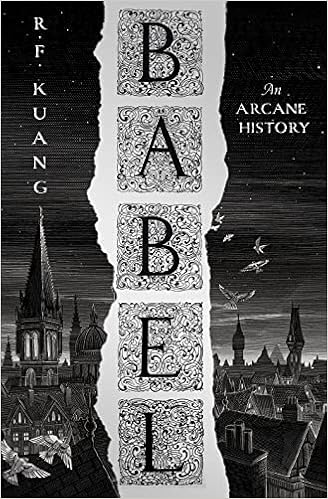Babel by R F Kuang
One such student is Robin Swift, born to a Chinese mother and an absent white father and brought to England from Canton (the city now called Guangzhou) as a child by an English academic, after the death of his Chinese family from cholera. Robin Swift is not, of course, his real name, but he's expected to take on an English name just as he's expected to take on English customs and manners. The only part of his Chinese origins he's allowed to maintain is his proficiency in Mandarin, which he can speak interchangeably with Cantonese and which makes him an ideal candidate for entry into Babel as an adult, if he proves to be able to master the Latin and Greek in which he is tutored day in, day out throughout his childhood and adolescence.
When Robin arrives at Oxford - friendless, shy and sheltered from normal daily life by his cold, cruel guardian - he is immediately drawn into Babel and its milieu, making friends with the other translation students Letty, Ramy and Victoire and being captivated by Oxford and the life of a privileged academic with an illustrious future. There are clear inequalities (most keenly felt by his fellow students Ramy and Victoire, who come from India and Haiti respectively and unlike Robin, can't pass as white) but Robin finds he can put his concerns aside in return for the tremendous opportunity and privileged lifestyle university offers. He loves the academic life, the status and education it affords him. Part of him bitterly resents Professor Lovell for tearing him away from Canton and robbing him of his culture, while part of him is grateful to be at Babel and desperate to fit in.
Babel is an engaging read but it isn't a fast-paced one, and there is extensive scene-setting and digression into matters of etymology and linguistics, as well as historical background. I personally loved those elements, footnotes and all, and the depth of RF Kuang's knowledge on these subjects is astonishing and the asides fascinating.If you're looking for something more propulsive, however, you might tire of them fairly soon. The main plot is sparked by Robin's encounter with the mysterious Griffin, another young man with Chinese ancestry who leads an underground movement dedicated to stopping Babel's exploitation of resources (both silver and human). Through Griffin, and egged on by Ramy and Victoire, Robin starts to see the full impact of European colonialism and its implied white supremacism. But can he bring himself to be part of a movement that might bring down Babel, the one place he's ever been truly happy? It's only really in the final quarter of the book that this conflict really kicks into action and the sense of peril increases.
The critiques of colonialism, along with the notion of translation as an intrinsically exploitative act, are certainly powerful. Reflecting Robin's own internal conflict, there also parts of the novel that read like a love letter to elite academia and parts that question the ethics of a system that overwhelmingly benefits wealthy white European men. There are certainly times during reading Babel when you will find yourself seething at the sheer injustice of it all - or at least you certainly should. The question of whether you can bring about a revolution without violence, and how many people might be expendable in the name of the greater good, is also an interesting one.
However, there are also elements of Babel that lack finesse. Its message is hammered home a little clumsily at times, and it paints a very over-simplified picture of some of the issues and feelings it explores. The unwavering stance taken by the novel is 'Britain and British bad, everyone else good', but it only ever depicts an exceptionally small and privileged segment of British society and opinion. It's absolutely right, of course, to say that colonialism is exploitative and intrinsically racist; I'd never argue that it wasn't. But Babel not only ignores the breadth of opinion that existed at the time, but also the other factors like the exploitation of the working classes in 19th century Britain by the ruling class, or indeed in China under the Qing dynasty: for most of the book, any society below the top echelons may as well not exist, only really appearing when a servant is required or an angry mob is necessary for the purposes of plot.
I also felt that while the scene was set very well in terms of locale, the book's sense of period was handled much less deftly. There are numerous anachronisms of attitude and speech which at times are forgivable as poetic licence but which at other times pulled me out of the story. I don't expect full-on authenticity in historical fiction but I do expect consistency and credibility of language and both were sometimes missing. Most of the characters lack development and the story arc for some of them are disappointingly anticlimactic, meaning moments that should have been heartbreaking felt cursory.
Babel has an excellent concept behind it and at its heart is a powerful message, but it lacks the richly immersive qualities of the best fantasy novels, and its execution just falls a little short at times. I loved the notion of a magic that comes from language, I loved Robin's inner conflict and I shared his simmering anger as he comes to understand the full implications of colonialism, but Babel didn't quite grip me as it should have done, failing to deliver the character and plot development I was hoping for.

Comments
Post a Comment